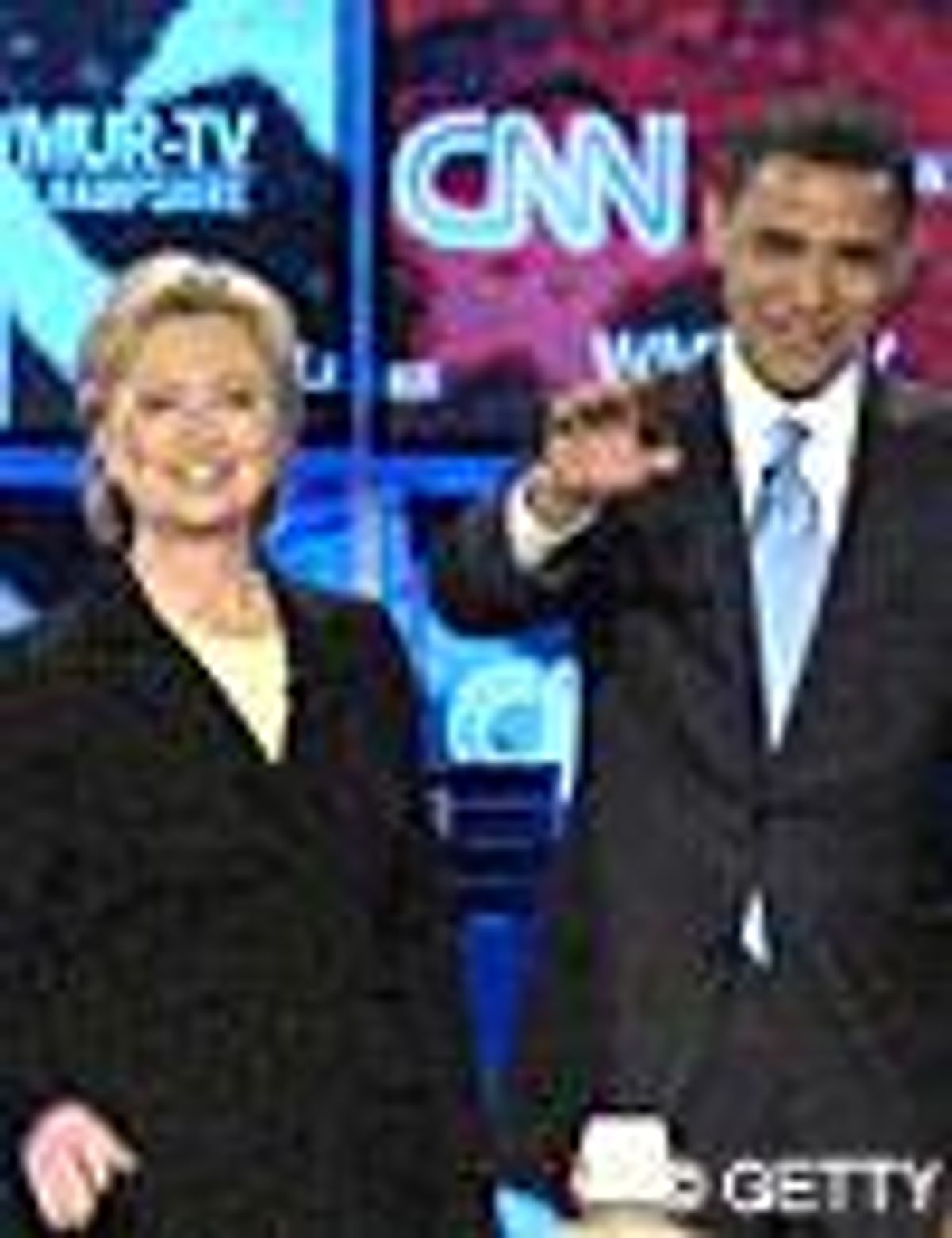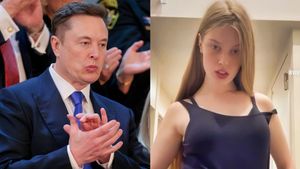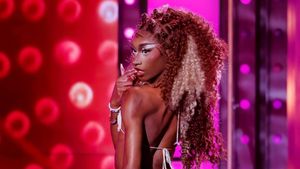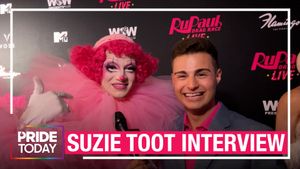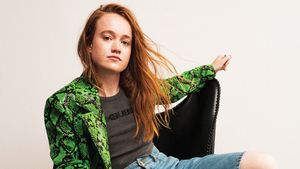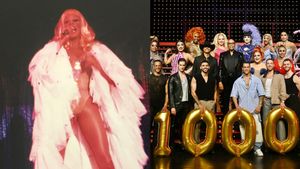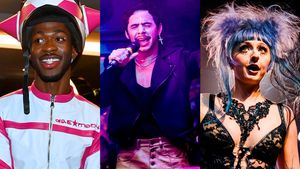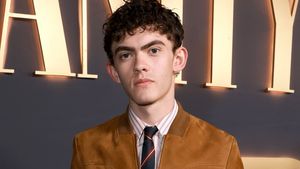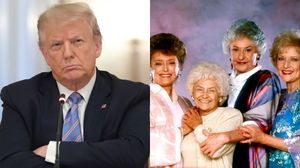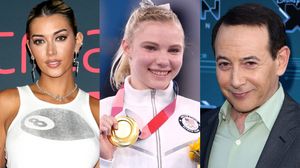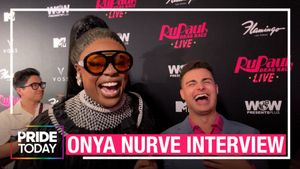The gay rights
movement reaches a milestone Thursday when its agenda is
the subject of a televised Democratic presidential forum.
Yet many activists--craving bolder support for
same-sex couples--view the unprecedented event
with mixed emotions.
Though pleased
that most of the candidates of a major party are
courting their votes and endorsing the bulk of their
political wish list, they are frustrated that none of
the front-runners is calling for legalization of
same-sex marriage.
The forum, to be
held in Los Angeles, is cosponsored by the Human Rights
Campaign, a gay rights group that has become increasingly
influential in Democratic politics, and by Logo, the
gay-oriented cable channel that will provide a live
telecast and Internet simulcast. Every Democratic
candidate except Joe Biden and Chris Dodd plans to
participate.
Human Rights
Campaign president Joe Solmonese will serve as a panelist,
along with singer Melissa Etheridge and Washington
Post editorial writer Jonathan Capehart.
''I hope we can
get genuinely heartfelt answers,'' said Solmonese, who
wants the leading candidates to explain why they remain wary
of same-sex marriage.
Organizers say
the forum marks the first time that major presidential
candidates will appear on TV specifically to address gay
issues.
''Simply seeing
the candidates step on a stage to speak to a national gay
television audience may be as moving as anything they say,''
said Logo's president, Brian Graden.
Logo, available
in about 27 million homes, offered to hold a second forum
for Republican candidates, but the GOP
front-runners--less supportive of gay rights
initiatives than the Democrats--showed no interest,
said Logo general manager Lisa Sherman.
The Democrats
will appear sequentially at 15-minute intervals during the
two-hour forum, never sharing the stage with one another.
All of them
support a federal ban on antigay job discrimination, favor
repeal of the ''don't ask, don't tell'' policy barring gays
from serving openly in the military, and support civil
unions that would extend marriage-like rights to
same-sex couples.
But thus far,
only two long shots--Rep. Dennis Kucinich of Ohio and
former Alaska senator Mike Gravel--have endorsed
nationwide recognition of same-sex marriage, which a
majority of Americans oppose.
''No viable
mainstream contender for president is going to support gay
marriage in this election cycle,'' said Ethan Geto, an
adviser to Hillary Rodham Clinton on gay rights
issues. ''I hope that's going to change in the next
couple of elections.''
Geto suggested
that Clinton's hesitancy on same-sex marriage stemmed from
her religious upbringing. Yet he also described her as a
passionate supporter of other gay rights causes who is
willing to raise those issues even before nongay
audiences.
One of Clinton's
chief rivals, John Edwards, has acknowledged wrestling
with his stance on same-sex marriage.
''I feel enormous
conflict about it,'' he said in a televised debate in
July. ''This is a very, very difficult issue for me.''
He noted that his
wife, Elizabeth, broke ranks with him in June and
publicly endorsed same-sex marriage.
The third
Democratic front-runner, Sen. Barack Obama, belongs to the
United Church of Christ, which supports same-sex marriage,
but Obama has yet to go that far.
Many gays and
lesbians have submitted questions they would like posed at
the forum; Charlene Strong of Seattle said she'd like to be
there in person.
Her longtime
partner, Kathryn Fleming, died in December after being
trapped by floodwaters, and Strong was initially barred from
the hospital room because she was not considered
immediate family.
''I'd like the
candidates to spell it out--what would you do to be
sure that doesn't happen,'' Strong said. ''How do you
get to full equality?''
Evan Wolfson, a
gay rights lawyer and executive director of Freedom to
Marry, said the good news--in his view--is that
all the Democratic candidates support fairness for
same-sex couples.
''The bad news is
they haven't yet grasped that equality in marriage is
how you achieve that fairness,'' Wolfson added. ''There is
no substitute. They wouldn't trade their marriage for
a civil union. Why should gay Americans?''
Wolfson said he
was frustrated by the candidates' sometimes awkward
answers regarding same-sex marriage.
''Americans would
respect someone who leads, rather than someone who
ducks and evades,'' he said.
Another activist,
Kate Kendell of the National Center for Lesbian Rights,
said she was unsure to what extent the candidates' hesitancy
reflected deep-set beliefs as opposed to political
calculations.
''Either way, it
leaves lesbian and gay couples in the position of being
publicly regarded as an inferior kind of relationship,'' she
said.
However, Rep.
Barney Frank of Massachusetts, one of two openly gay
members of Congress, said he understood the candidates'
caution.
''It's not wrong
for people trying to become president to take political
considerations into account,'' Frank said. ''I don't want a
bunch of martyrs on my side.''
Among the
Republicans, none of the candidates favor repeal of ''don't
ask, don't tell,'' and only former New York City mayor
Rudolph Giuliani has supported limited legal
recognition for same-sex couples.
Some conservative
activists have denounced the upcoming forum.
''It's
disgraceful that our nation's moral standards have now
dipped so low that it's considered 'tolerant' to hold
a debate organized entirely around the promotion of
sexual immorality,'' said Matt Barber, cultural issues
policy director for Concerned Women for America. (David
Crary, AP)
The Advocate
will provide comprehensive coverage of the
HRC/Logo Forum at www.advocateinsider.com with live
blogging throughout the event as well as
from the fund-raisers following the
forum where candidates are scheduled to appear.
